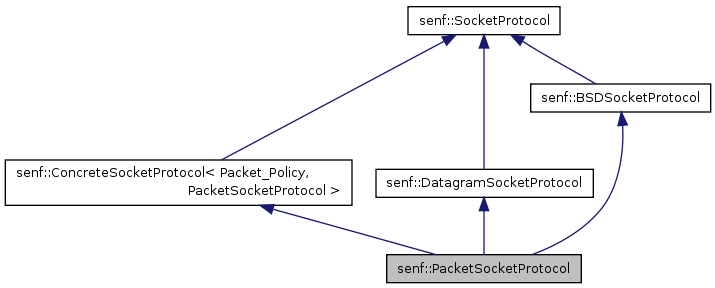senf::PacketSocketProtocol Class Reference
[Protocol Implementations (Concrete Protocol Classes)]
Raw Packet-Socket access (Linux). More...
#include <senf/Socket/Protocols/Raw/PacketSocketHandle.hh>

Detailed Description
Raw Packet-Socket access (Linux).- Socket Handle typedefs:
- PacketSocketHandle (ProtocolClientSocketHandle)
- Policy Interface:
- ClientSocketHandle::read(), ClientSocketHandle::readfrom(), ClientSocketHandle::writeto(), ClientSocketHandle::bind(), ClientSocketHandle::local()
- Address Type:
- LLSocketAddress
This class is utilized as the protocol class of the ProtocolClientSocketHandle via the Socket Handle typedefs above.
Definition at line 77 of file PacketSocketHandle.hh.
Public Types |
|
| enum | SocketType { RawSocket, DatagramSocket } |
Constructors |
|
| void | init_client (SocketType type=RawSocket, int protocol=-1) const |
| Create packet socket. |
|
Protocol Interface |
|
| void | mcAdd (std::string const &interface, MACAddress const &address) const |
| Enable reception of a multicast group. |
|
| void | mcDrop (std::string const &interface, MACAddress const &address) const |
| Disable reception of a multicast group. |
|
| void | promisc (std::string const &interface, bool mode) const |
| enable/disable promiscuous mode |
|
Abstract Interface Implementation |
|
| unsigned | available () const |
| Return (maximum) number of bytes available for reading < without < blocking. |
|
| bool | eof () const |
| Check for end-of-file condition. |
|
Member Enumeration Documentation
| enum senf::PacketSocketProtocol:: | ||||
| SocketType | ||||
Definition at line 83 of file PacketSocketHandle.hh.
Member Function Documentation
| unsigned senf::PacketSocketProtocol:: | ||||
| available | () | |||
Return (maximum) number of bytes available for reading < without < blocking.
This member will check in a (very, sigh) protocol dependent way, how many bytes may be read from a socket in a single (non-blocking) read operation. If the socket does not support reading (viz. NotReadablePolicy is set), this member should always return 0.
Depending on the protocol, it may not be possible to return a good value. In this case, an upper bound may be returned (e.g.: When reading from a socket which returns ethernet frames, returning 1500 from available() is ok). However, this should only be done as a last resort. Also beware, that this number should not be too large since the socket layer will always need to allocate that number of bytes for the data to be read.
Implements senf::SocketProtocol.
Definition at line 57 of file PacketSocketHandle.cc.
| bool senf::PacketSocketProtocol:: | ||||
| eof | () | |||
Check for end-of-file condition.
This is another check which (like available()) is extremely protocol dependent. This member will return true only, if at end-of-file. If the protocol does not support the notion of EOF, this member should always return false.
Implements senf::SocketProtocol.
Definition at line 68 of file PacketSocketHandle.cc.
| void senf::PacketSocketProtocol:: | ||||
| init_client | ( | SocketType |
type = RawSocket, |
|
| int |
protocol = -1
|
) | ||
Create packet socket.
The new socket will receive all packets of the given IEEE 802.3 protocol. The socket will receive all packets, if protocol is -1.
If type is RawSocket, the packet will include the link-level header (the Ethernet header). Sent packets must already include a well formed ll header.
If type is DatagramSocket, the link level header will not be part of the packet data. The ll header will be removed from received packets and a correct ll header will be created on sent packets.
- Parameters:
-
[in] type socket type [in] protocol IEEE 802.3 protocol number
- Note:
- This member is implicitly called from the ProtocolClientSocketHandle::ProtocolClientSocketHandle() constructor
Definition at line 43 of file PacketSocketHandle.cc.
| void senf::PacketSocketProtocol:: | ||||
| mcAdd | ( | std::string const & | interface, | |
| MACAddress const & | address | ) | ||
Enable reception of a multicast group.
mcAdd will join a new multicast group.
- Parameters:
-
[in] interface interface with which to join [in] address multicast address to join
- See also:
- LLSocketAddress
Definition at line 93 of file PacketSocketHandle.cc.
| void senf::PacketSocketProtocol:: | ||||
| mcDrop | ( | std::string const & | interface, | |
| MACAddress const & | address | ) | ||
Disable reception of a multicast group.
- See also:
- mcAdd()
Definition at line 100 of file PacketSocketHandle.cc.
| void senf::PacketSocketProtocol:: | ||||
| promisc | ( | std::string const & | interface, | |
| bool | mode | ) | ||
enable/disable promiscuous mode
Definition at line 107 of file PacketSocketHandle.cc.
The documentation for this class was generated from the following files:
- Protocols/Raw/PacketSocketHandle.hh
- Protocols/Raw/PacketSocketHandle.cc